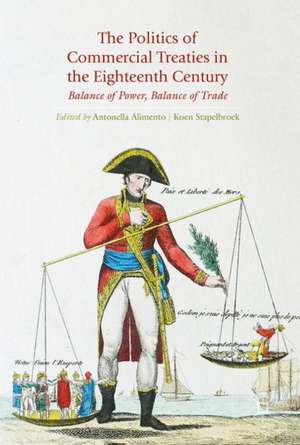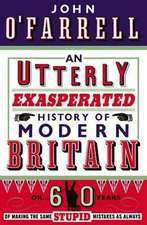The Politics of Commercial Treaties in the Eighteenth Century: Balance of Power, Balance of Trade
Editat de Antonella Alimento, Koen Stapelbroeken Limba Engleză Hardback – 4 oct 2017
| Toate formatele și edițiile | Preț | Express |
|---|---|---|
| Paperback (1) | 756.70 lei 38-44 zile | |
| Springer International Publishing – 14 aug 2018 | 756.70 lei 38-44 zile | |
| Hardback (1) | 1126.85 lei 43-57 zile | |
| Springer International Publishing – 4 oct 2017 | 1126.85 lei 43-57 zile |
Preț: 1126.85 lei
Preț vechi: 1374.21 lei
-18% Nou
Puncte Express: 1690
Preț estimativ în valută:
215.62€ • 225.73$ • 178.41£
215.62€ • 225.73$ • 178.41£
Carte tipărită la comandă
Livrare economică 07-21 aprilie
Preluare comenzi: 021 569.72.76
Specificații
ISBN-13: 9783319535739
ISBN-10: 3319535730
Pagini: 365
Ilustrații: XI, 472 p. 9 illus., 6 illus. in color.
Dimensiuni: 148 x 210 mm
Greutate: 7.22 kg
Ediția:1st ed. 2017
Editura: Springer International Publishing
Colecția Palgrave Macmillan
Locul publicării:Cham, Switzerland
ISBN-10: 3319535730
Pagini: 365
Ilustrații: XI, 472 p. 9 illus., 6 illus. in color.
Dimensiuni: 148 x 210 mm
Greutate: 7.22 kg
Ediția:1st ed. 2017
Editura: Springer International Publishing
Colecția Palgrave Macmillan
Locul publicării:Cham, Switzerland
Cuprins
1. Trade and Treaties: Balancing the Interstate system; Antonella Alimento & Koen Stapelbroek.- 2. Égalité, réciprocité, souveraineté. The role of commercial treaties in Colbert’s economic policy; Moritz Isenmann.- 3. The Anglo-Portuguese Methuen Treaty of 1703: Opportunities and Constraints of Economic Development; José Luís Cardoso.- 4. The Anglo-French Treaty of Utrecht Revisited: The Politics of Alliance and Rivalry; Doohwan Ahn.- 5. The Anglo-Spanish Asiento treaty in the early eighteenth century; Maria Virginia León & Niccolò Guasti.- 6. Negotiating the balance of power: Russian-Spanish commercial relations in the early eighteenth century; Olga Volosyuk.- 7. Reinventing the Dutch Republic: Franco-Dutch commercial treaties from Ryswick to Vienna; Koen Stapelbroek,- 8. The conditions of trade in wartime: treaties of commerce and maritime law in the eighteenth century; Eric Schnakenbourg.- 9. From privilege to equality: commercial treaties and the French solutions for international competition (1705-1790); Antonella Alimento,- 10 Securing Asian Trade: Treaty Negotiations between the French and English East India Companies, 1753–1755; John Shovlin.- 11. The Rise of a Trading Nation. Prussia and the ‘Convention préliminaire de commerce’ with France (1753); Marco Cavarzere.- 12. War, Neutrality and Commercial Treaties: The Savoyard State 1660-1789; Christopher Storrs.- 13. Negotiating a trade treaty in the imperial context: The Habsburg Monarchy in the eighteenth century; Christine Lebeau.- 14. French Representations of the 1786 Franco-British Commercial Treaty; Pascal Dupuy.- 15 Haiti’s Commercial Treaties: Between Abolition and the Persistence of the Old Regime; Paul Cheney.- 16. What trade for a republican people? French Revolutionary debates about commercial treaties (1792-1799); Marc Belissa.
Recenzii
“The volume at hand should be celebrated for highlighting their importance for early modern history in general and for political economy more specifically. … this excellent edited volume offers a welcome reminder not only of the high stakes of our current predicaments but also of how long they have been so and why peaceful international order remains so elusive in a world where wealth and power are positional goods.” (Sophus A. Reinert, Journal of Modern History, Issue 9, 2019)
Notă biografică
Antonella Alimento is an Associate Professor in Modern History at the University of Pisa, Italy. Her main research interests are European eighteenth-century political and economic history, with a special focus on France.
Koen Stapelbroek is an Academy of Finland Research Fellow at the University of Helsinki, Finland, and Associate Professor at Erasmus University Rotterdam, The Netherlands. His research focuses on political economic thought in eighteenth-century Europe.
Koen Stapelbroek is an Academy of Finland Research Fellow at the University of Helsinki, Finland, and Associate Professor at Erasmus University Rotterdam, The Netherlands. His research focuses on political economic thought in eighteenth-century Europe.
Textul de pe ultima copertă
This book is the first study that analyses bilateral commercial treaties as instruments of peace and trade comparatively and over time. The work focuses on commercial treaties as an index of the challenges of eighteenth-century European politics, shaping a new understanding of these challenges and of how they were confronted at the time in theory and diplomatic practice. From the middle of the seventeenth century to the time of the Napoleonic wars bilateral commercial treaties were concluded not only at the end of large-scale wars accompanying peace settlements, but also independently with the aim to prevent or contain war through controlling the balance of trade between states. Commercial treaties were also understood by major political writers across Europe as practical manifestations of the wider intellectual problem of devising a system of interstate trade in which the principles of reciprocity and equality were combined to produce sustainable peaceful economic development.
Caracteristici
Offers a new paradigm for thinking about the political economy of the international order in the eighteenth century through the subject of commercial treaties
Utilises commercial treaties to explore how European states with global economic portfolios work as a whole and how statesmen and political writers thought about reforming and stabilising it
Combines divergent historical methodologies with a transnational approach to explain hitherto unaccounted aspects of local, national politics and economic debates
Utilises commercial treaties to explore how European states with global economic portfolios work as a whole and how statesmen and political writers thought about reforming and stabilising it
Combines divergent historical methodologies with a transnational approach to explain hitherto unaccounted aspects of local, national politics and economic debates











